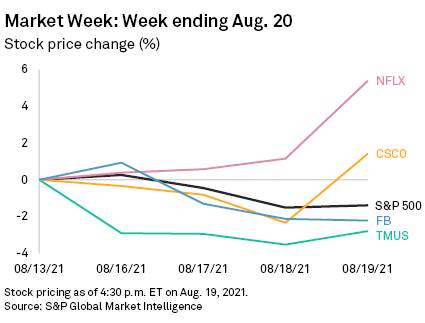T-Mobile slides on security breach; Facebook shares unfazed by new FTC action
A major cyberattack is never good for business, nor is it good for a company’s stock price.
T-Mobile US Inc. shares slid this week after the company announced it was investigating claims of a security breach. T-Mobile confirmed Aug. 18 that a subset of company customer data had been accessed by unauthorized individuals. This subset included just over 40 million records of former or prospective customers who had previously applied for credit with the carrier, as well as 7.8 million current T-Mobile postpaid customer accounts’ information. Both figures were subsequently raised on Aug. 20.
Analysts told S&P Global Market Intelligence that customers will likely view the incident as an unfortunate reality of having a cell phone and not a reason to switch carriers.
“In reality, most people aren’t negatively affected enough to consider changing providers or getting rid of their cell phones. It’s just an assumed risk,” Recon Analytics analyst Roger Entner said.
However, data from 451 Research’s “Voice of the Connected User Landscape: Connected Customer, Trust and Privacy” survey shows some consumers rethink their relationship with a business if it suffers a data breach that exposes the consumer’s data. Among respondents who had been notified that they were affected by the breach, nearly 1 in 5 respondents reduced business with the company that was breached. About 15% canceled their accounts and switched to new providers.
T-Mobile shares closed at $140.89 apiece, down 2.8% for the week to date.

In streaming, Netflix Inc. shares popped on Aug. 19 to close at $543.71, up 5.4% for the week to date. During the week, news broke that the U.S. Securities Exchange Commission on Aug. 18 charged three former Netflix software engineers and two others with insider trading that netted the group more than $3 million in profits.
Sung Mo “Jay” Jun, a former software engineer at the company, allegedly led the insider trading ring, accessing data on subscriber growth and trading shares of Netflix prior to earnings announcements. The SEC caught the group by using tools that detect when traders have improbable levels of success trading the securities of a company over a period of time.


